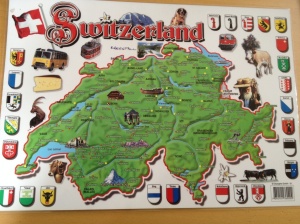This is the first post of a series called „Switzerland“, where I will write about the multilinguality, interesting facts and habits of this country.
I will start with the name of Switzerland. It often happens that people ask me where the name of Switzerland comes from. Especially those who have been to Switzerland and know that it sounds similar to Schwyz, one of the 26 cantons of Switzerland. – Here is a quick answer to this.
In the four national languages, Switzerland is called Schweiz (German), Suisse (French), Svizzera (Italian) and Svizra (Rumantsch). They all relate to the toponym Schwyz that has been first attested in 972 in Suittes (Old High German). Suittes is apparently related to suedan „to burn“ and refers to the area of forest that was burned and cleared to build (cfr. Room, Adrian. Placenames of the World. London: MacFarland and Co., Inc., 1997). Later on, this name was extended to the area dominated by the canton Schwyz and after the Swabian War of 1499, it was gradually used for the entire Confederatio Helvetica. Therefore, the German name of the country, Schwiiz, is a homophonous to the name of the canton and the settlement. Only the use of the definite article d’Schwiiz for the Confederation helps to distinguish it from Schwyz for the canton and the town.
The English name Switzerland is a compound, consisting of Switzer – „the Swiss“ – and –land: „the land of the Swiss“. The name Switzer comes from the Alemannic Schwiizer, the name of the inhabitants of Schwyz and his territory, and one of the cantons which formed the nucleus of the Old Swiss Confederacy.
The English name Swiss for the inhabitants of Switzerland, is loaned from the French Suisse (in use since the 16th century). – The name Switzerland itself is therefore a pars pro toto (“a part taken from the whole”) to the whole Confoederatio Helvetica.
The New Latin name of Confederatio Helvetica has been introduced gradually after the formation of the federal state in 1848 and derives from the name of the Helvetii, a Gaulish tribe living on the Swiss plateau before the Roman era. And this explains the abbreviation “CH”.

Categories: Switzerland






Thanks for this. I look forward to this series. My grandmother’s family is from Canton Bern. No one has spoken Schweizerdeutsch since my great-grandmother. I’ve been to see our relatives a couple times. The funny thing was my cousin’s husband would rather speak English with me than Hochdeutsch. I didn’t know there were language-patriots there for the sake of their local dialect.
LikeLike
Most of this was complete news to me. I’d often wondered about the ‘CH’.
Eagerly awaiting the next installment…
LikeLike
I’m really glad you liked! The next posts will follow asap, promised 😉
LikeLike
That’s interesting! So your grandmother didn’t talk Schweizerdeutsch with you? Never? Even not some typlical expressions? – About Swissgermans and Hochdeutsch: they consider Hochdeutsch as their first foreign language and don’t feel very comfortable talking it. Fact is, that people on the street, in the stores etc. all talk the local dialect. The same on TV and radio. Only for news they switch to their Swiss-Standard-German (that is quite different from the German in Germany and the German in Austria etc.). – I’m preparing a post about Swiss language(s) in general, and will write some more about the local dialects soon.
LikeLike
He just wanted to speak English with me. I thought Hochdeutsch might be a more “neutral” language, but not so with him.
LikeLike
Oh yes, I understand. Sometimes Swissgermans feel intimidated by people talking German, especially non-native speakers, as they feel somehow obliged to speak it better. Not all of them, though – I have several Swissgerman friends who have an excellent competence of Hochdeutsch! He probably chose English to make you feel more comfortable or to let you know that he shares this language with you.
LikeLike
Try to say: Chuchichäschtli (on Wikipedia they tell you how to pronounce this) 🙂
LikeLike
Sali Jenny ;-). Oh, I would love to know more about the “real life stories” from the other side of the Röstigraben! – Maybe in a guest-post?
LikeLike
With pleasure…’ya pas le feu’ (you need to watch the video ‘Genevois style’ on Youtube!). Let me know what and when and I am happy to contribute!
LikeLike
Oh yes! I don’t know why I didn’t have problems to pronounce that schibboleth [ˈχʊχːiˌχæʃtli]. Actually, the [χ] sound is easy to pronounce for Arabic, Hebrew and Dutch speakers 🙂
LikeLike
True 🙂
LikeLike
Ha! Thanks for getting me back to my roots. I had to learn a little Schwiterduetsch so I could speak to the kids of my relatives. They were too small to know Hoschdeutsch. It was really hard!
LikeLike
I can imagine! Even for us natives in German (Hochdeutsch) it is not easy to understand, let alone to speak it! Jenny
LikeLike
Well, I think that it’s a bit easier for people living next to the Swissgerman border. But it’s so true, some Swissgerman dialects are very difficult to understand and speak. I found the Berner dialect less difficult – or is it because they tend to speak slowly 😉 ? I’ll write a post about the dialects soon and am looking forward to continue this conversation!
LikeLike
i freu mi scho 😉
LikeLike
Thank you. Exactly the learned explanation and historical details that I love!
LikeLike
Grazie mille, cara. I’m happy you liked!
LikeLike
Sali, 😉 very interesting facts that I did not know of. Thanks for posting this! Looking forward to reading more… let me know if you need some ‘real life stories’ from the other side of the ‘Röstigraben’! Jenny
LikeLike
Great Jenny! I’ll let you know. I’ve not finished the whole plan about this series, but a “real life story”-chapter is a brilliant idea. – The Genevois style is great, thanks for the hint! (j’crois que c’est clair, ou bien?…) 😉
LikeLike